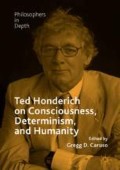Abstract
Moment to moment there can be sights, sounds, feels, tastes, and smells, informing us of the world around us and of ourselves. Being conscious encompasses all this and more. What is it to be conscious of each of these things? Can I be conscious of all of them at the same time? Am I conscious of each of them in the same way and to the same extent? They seem to flesh out the continuous and unified details of my current conscious state. But is that right, or do I only become conscious of each thing as I notice it, shifting attention from one thing to another? It’s hard to say. And that’s because it is hard to get to grips with each conscious moment as it transpires. Yet that’s what philosophical reflections on consciousness seem to require. How are we aware of these conscious states? How well can we know them as we undergo them? And can our answers to these questions tell us anything about the nature of consciousness? I here argue that we cannot rely on just our intuitive take on our own experience to know what is going on there. What we seem to pick out, whether by misleading talk of “what it’s like,” or by “untutored attention,” do not necessarily provide constraints on account of the nature of consciousness. Instead, we need philosophers, psychologists, and neuroscientists working together to elicit information from different sources in order to arrive at a collective view of how the different types of evidence and information fit together to produce the best explanation of the phenomena of consciousness we are interested.
Notes
- 1.
For an account of all the senses involved in the multisensory perception of flavour, see Smith (2015).
- 2.
In writing this chapter I was hugely helped by talks with Tony Marcel and Sarah Garfinkel to whom I’m very grateful. Any weaknesses in the text are mine.
References
Dennett, Daniel C. 1991. Consciousness explained. New York: Little Brown.
Honderich, Ted. 1988. A theory of determinism: The mind, neuroscience and life hopes. Oxford: Oxford University Press.
———. 2014. Actual consciousness. Oxford: Oxford University Press.
———. 2017. MIND: Your being conscious is what and where? Chicago: Chicago University Press. [Cited page numbers are to the penultimate draft and not the published version.]
Marcel, A.J. 1993. Slippage in the unity of consciousness. In Experimental and theoretical STUDIES of consciousness, ed. G.R. Bock and J. Marsh, 168–179. Chichester: Wiley.
———. 2003. Introspective report: Trust, self-knowledge and science. Journal of Consciousness Studies 10: 167–186.
Rosenthal, David. 1986. Two concepts of consciousness. Philosophical Studies 49 (3): 329–359.
Smith, Barry C. 2006. Consciousness: An inner view of the outer world. Journal of Consciousness Studies 13 (7–8): 175–186.
———. 2015. The chemical senses. In The Oxford handbook of philosophy of perception, ed. Mohan Matthen, 314–352. New York: Oxford University Press.
Author information
Authors and Affiliations
Editor information
Editors and Affiliations
Rights and permissions
Copyright information
© 2018 The Author(s)
About this chapter
Cite this chapter
Smith, B.C. (2018). Consciousness: What Is It Like?. In: Caruso, G. (eds) Ted Honderich on Consciousness, Determinism, and Humanity. Philosophers in Depth. Palgrave Macmillan, Cham. https://doi.org/10.1007/978-3-319-66754-6_6
Download citation
DOI: https://doi.org/10.1007/978-3-319-66754-6_6
Published:
Publisher Name: Palgrave Macmillan, Cham
Print ISBN: 978-3-319-66753-9
Online ISBN: 978-3-319-66754-6
eBook Packages: Religion and PhilosophyPhilosophy and Religion (R0)

